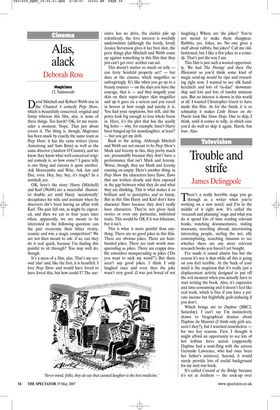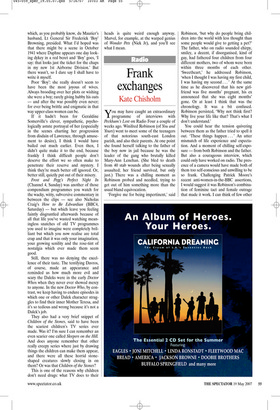Trouble and strife
James Delingpole
There’s a really horrible stage you go through as a writer when you’re working on a new novel, and I’m in the middle of it right now. It’s called the ‘research and planning’ stage and what you do is spend lots of time reading relevant books, watching documentaries, visiting museums, travelling abroad, interviewing interesting people, surfing the net, idly contemplating, searching Amazon to see whether there are any more relevant research books you haven’t yet bought.
I’ve made it sound almost fun but the reason it’s not is that while all this is going on you feel terrible. At the back of your mind is the suspicion that it’s really just a displacement activity designed to put off the evil moment when you actually have to start writing the book. Also, it’s expensive and time-consuming and it doesn’t feel like real work, which is fine if you have a private income but frightfully guilt-inducing if you don’t.
Which brings me to Daphne (BBC2, Saturday). I can’t say I’m instinctively drawn to biographical dramas about Daphne du Maurier (I think only girls are, aren’t they?), but I watched nonetheless for two key reasons. First, I thought it might afford an opportunity to see lots of hot lesbian lurve action (supposedly Daphne had a semi-fling with the actress Gertrude Lawrence, who had once been her father’s mistress). Second, it would surely provide lots of useful background for my next war book.
It’s called Coward at the Bridge because it’s set at Arnhem — the cock-up over which, as you probably know, du Maurier’s husband, Lt General Sir Frederick ‘Boy’ Browning, presided. What I’d hoped was that there might be a scene in October 1941 where Daphne appears one day looking dykey in a red beret and ‘Boy’ goes, ‘I say: that looks just the ticket for the chaps in my new 1st Airborne Division.’ But there wasn’t, so I dare say I shall have to write it myself.
Poor ‘Boy’: she really doesn’t seem to have been the most joyous of wives. Always brooding over her plots or wishing she were a boy; rarely giving hubby his oats — and after the war possibly even never; for ever being brittle and enigmatic in that way upper-class women can be.
If it hadn’t been for Geraldine Somerville’s clever, sympathetic, psychologically astute portrayal of her (especially in the scenes charting her progression from disdain of Lawrence, through amusement to desire), I think I would have bailed out much earlier. Even then, I didn’t quite make it to the end, because frankly I think difficult people don’t deserve the effort we so often make to penetrate their reserve and mystery. I think they’re much better off ignored. Or, better still, quietly put out of their misery.
Frost and Pegg’s Perfect Night In (Channel 4, Sunday) was another of those compendium programmes you watch for the wacky, witty, subversive commentary in between the clips — see also Nicholas Craig’s How to Be Edwardian (BBC4, Saturday) — but which leave you feeling faintly disgruntled afterwards because of all that life you’ve wasted watching meaningless snatches of old TV programmes you used to imagine were completely brilliant but which you now realise are total crap and that it was only your imagination, your growing senility and the rose-tint of nostalgia which ever made them seem good.
Still, there was no denying the excellence of their taste. The terrifying Davros, of course, made an appearance and reminded us how much more evil and scary the Daleks were in the early Doctor Whos when they never ever showed mercy to anyone. In the new Doctor Who, by contrast, we keep having to endure episodes in which one or other Dalek character struggles to find their inner Mother Teresa, and it’s so tedious and wrong because it’s not a Dalek’s job.
They also had a very brief snippet of Children of the Stones, said to have been the scariest children’s TV series ever made. Was it? I’m sure I can remember an even scarier one called Sleepers on the Hill. And does anyone remember that other really creepy series where just by drawing things the children can make them appear, and there were all these horrid stoneshaped creatures slowly closing in on them? Or was that Children of the Stones?
This is one of the reasons why children don’t need drugs: what TV does to their heads is quite weird enough anyway. Marvel, for example, at the warped genius of Wonder Pets (Nick Jr), and you’ll see what I mean.











































































 Previous page
Previous page